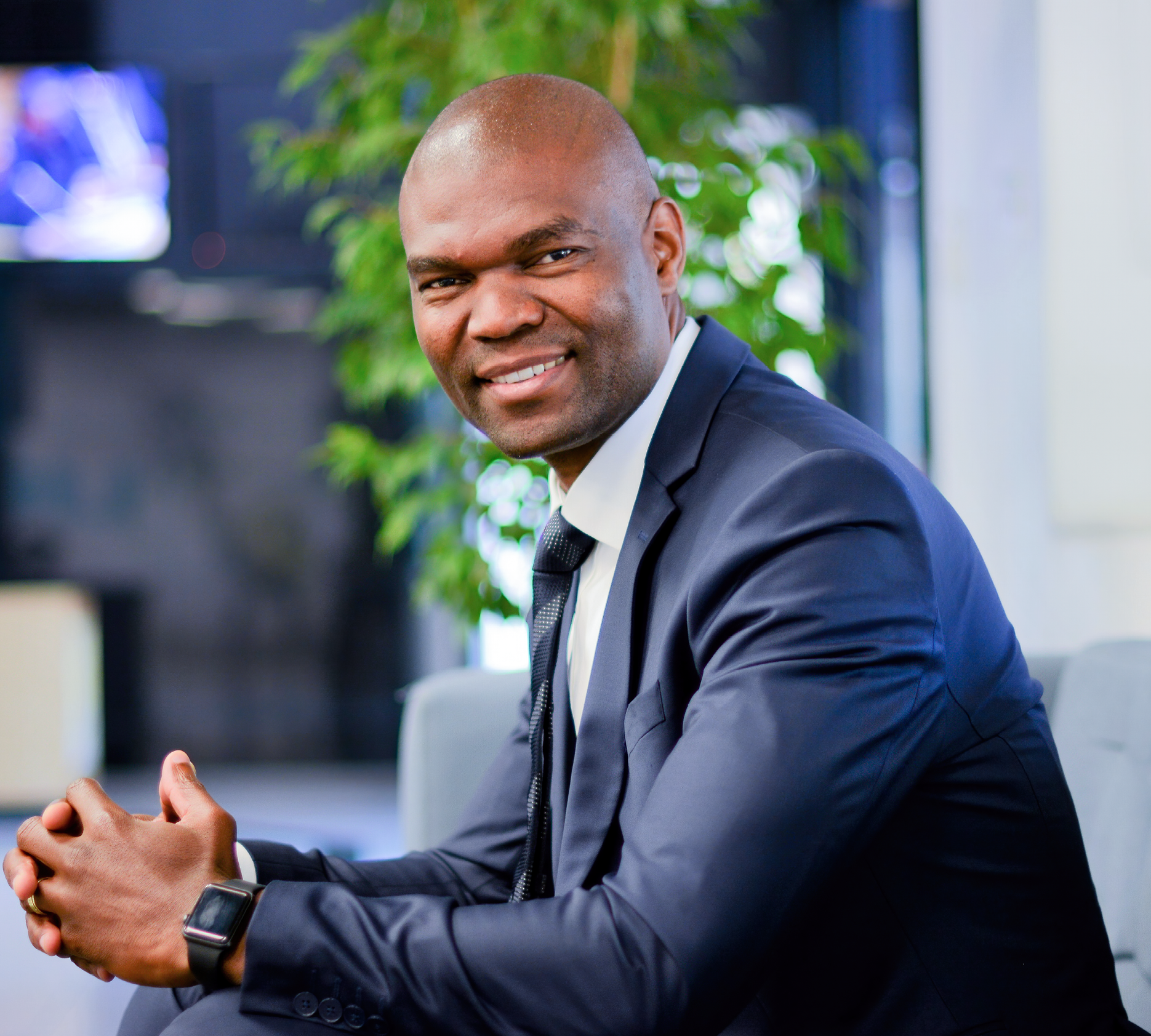Joe Makhafola chatted with Vukani Mngxati, Chief Executive Officer of Accenture in Africa, a global professional services company with leading capabilities in digital, cloud and security. Combining unmatched experience and specialised skills across more than 40 industries, Accenture offers Strategy and Consulting, Interactive, Technology and Operations services—all powered by the world’s largest network of Advanced Technology and Intelligent Operations centres. The group’s 569 000 people deliver on the promise of technology and human ingenuity every day around the globe.
Born and bred in Durban, Vukani Mngxati is no ordinary legend. He was recruited by Accenture at the University of Durban-Westville, KwaZulu-Natal 22 years ago and he was awarded a study bursary by the company. After graduating he had seven other lucrative offers from other companies, but he never looked back. He chose Accenture.
Speaking to Vukani you can feel a sense of pride for a man who represents a leading company ranked Number 1 in professional services and Number 2 overall in South Africa at the Top Employer Awards 2021.
One of the biggest multinationals in the world, Accenture is focused on enabling change to create a better workplace and society at large. Mngxati’s Mondays and Tuesdays are dedicated to dealing with numbers in the company, sales, revenue, and profits. Fridays he attends to his people and takes no external meetings because of his high regard for internal stakeholders. Wednesdays and Thursdays offer him the chance for a forward-thinking outlook as he focuses on people and the things that the company should be doing today for tomorrow.
The story of Accenture in South Africa dates back about five decades ago—a significant milestone the company celebrated last year.
“I chose Accenture for three reasons. They promised to train me overseas and so it was well done and well organised. They sent me to Chicago to learn how to be a consultant—I thought I have never even been out of the country. Thirdly, I connected with the people especially in the consulting environment and I think it was mostly about technology because I had also studied technology at University. It was a real good connection,” says Mngxati.
What sets Accenture apart from its peers is its concerted effort to create value for its clients, he says. This obsession with making sure that you deliver value to a client was drummed into his head when he joined the company as a youngster. It is not always about the money.
Integrity is another point that is enshrined in their core values.
“At the core it is about making sure that we do the right thing even if there’s no one watching,” he says.
The last thing which differentiates this powerhouse company from the rest is, quite simply, its people. Most staff have decades of service with the company. Their staying power is derived from passion and witnessing the changing lives of their peers around them each day.
“One of our employees has been with us for 50 years since 1971. It is not uncommon that we have such tried and tested employees. We have people with the same values, culture and understanding of the bigger picture,” adds Mngxati.
Accenture recently celebrated 50 years of adding value in South Africa, and during this time the company has been an advocate for equality and diversity in the workplace. Not only have they received numerous awards for having implemented sustainable programmes to enhance skills and provide employment opportunities for people—especially youth and those living with disabilities—but also actively sponsoring other awards that advocate for gender equality in the workplace.
“In the past year, we have made continuous efforts to improve the employee experience by promoting work/life integration, empowering women to get an equal opportunity to display their talents and abilities, and through a focus on self-care via healthy living and mental well-being.
“Being placed first in the professional services category and second among all companies in the running for the awards in the country is a huge accolade for Accenture and our people. It is a testament of the great effort we put daily into growing our company and careers for our people while delivering value-driven solutions to our clients,” says Mngxati.
In a letter that comes directly from the Desk of the President himself, President Cyril Ramaphosa shares his view that South Africa’s economic recovery in the aftermath of the Coronavirus pandemic should be viewed from a transformational perspective as an opportunity to reimagine the local economy within a new global context.
He highlights, in particular, the potential of the digital economy as a driver of this transformation, creating much-needed employment opportunities, especially among the youth of South Africa.
Delivering financial performance and the overall performance of the company in these trying times of COVID-19, the virus did not spare Accenture, yet the company proved once again that business resilience is key to a progressive global technology landscape.
Mngxati has long been a firm believer in the value of resilience as a prerequisite for business success in fast-changing environments. The pandemic, however, catapulted resilience to the forefront as indispensable to business sustainability and relevance. This is reflected, for example, in the strong focus on resilience in work done in collaboration with the World Economic Forum around “The Connected Value Chain”.
The pandemic really reaped havoc and its effects point to links in the value chain of businesses most vulnerable to disruption, and it is these areas where resilience should be improved. In the mining and minerals sector, for example, reliance on individual companies and geographic areas proved problematic, pointing to the need to diversify the supplier base. In the travel and tourism sector—arguably the sector most obviously and immediately affected by the pandemic, areas highlighted for improvement include flexibility as it relates to cancellation policies, safety, and traveller confidence.
South Africans have suffered some of the toughest lockdown restrictions as a result of the global pandemic, and a tired nation is looking desperately ahead to a time without masks, social distancing, restrictions on trade, entertainment, and travel to ease their personal suffering. However, Mngxati is part of Accenture’s push to drive the company into exciting new markets in years to come.
“What makes us think about our operations and markets during the pandemic—and even post the pandemic—is the spirit of innovation which is at the heart of our organisation. We always think of smart new ways of solving any problems that step into our path and, because of this mindset and culture, we also tend to be ahead of the game. People talk about the cloud and the cloud is now a real buzzword everywhere, but we invested in cloud infrastructure and capabilities a long time ago. The world of communication in marketing is moving away from billboards and banners alongside the highways and now resides in cellphone technology. The biggest advertising tool is in the hand of each and every one of your customers,” says Mngxati.
Accenture made significant investments as a firm to ensure they were at the front of the cloud queue to maximise the benefits of being an early adopter. They also rolled out extensive training as well as equipment and software upgrades to ensure that their people were equipped with the skills and tools required to ensure that Accenture would become a leader in cloud operations.
“The right means and the right people have ensured that we are able to come up with the right solutions for our clients,” he adds.
Accenture’s thorough preparation and meticulous attention to details have also helped to keep the organisation strong and extremely resilient as a business through the pandemic.
“We have gone through very tough patches as a country and the world as a result of COVID-19 but our business remains strong. In fact, the growth in the business that we are seeing right now is even faster than what we had seen before COVID-19, which is a fascinating thought,” says Mngxati.
While countless companies suffered significant losses in revenues and sales, along with massive disruptions in their operations due to global supply chains coming to halt during COVID, it’s true that Accenture—despite their best efforts and the presence of—were equally not spared from such losses.
“We also received quite a bit of disruption in our business and we saw a softness in our numbers. We are as successful as our clients are successful, but the reality is that our clients were also in trouble and they also didn’t understand what was going to happen in the future.
“Fortunately, we quickly sailed through those turbulent waters and the biggest reason for our success in surviving the troubled time rests in a combination of services that resonated outright, and without which we probably would not be where we are right now. Being ahead of the curve and trends in technology and innovation put us ahead.”
The new normal
“This situation is most likely untenable,” says Mngxati. “I have been in quarantine here with my family because our helper tested positive for COVID-19. We didn’t leave the house once but we were fortunate that we had everything we needed—absolutely everything. You go online you can get everything you need, so the way the world is now wired and the way that we think about buying goods and services has been significantly changed by COVID-19 and by the way, it’s never going to get back to ‘normal’. This is normal now!”
Similarly, the world of marketing as we know it today is fast getting extinct. In the next five to 10 years, he believes that the marketing business will have changed fundamentally into a technology-driven system to capitalize on the advent of e-commerce.
“This is one more reason to prepare for the future. Last year, 60% of the cars that were sold were sold online and nobody test drove those cars before buying them. That represents a significant change in how customers think and operate today. Food for thought,” he smiles.
“The mindset of our team and the leadership of the business inherently have a growth mindset which allows us to think about what the smart things are to do now, what should be done and how we can navigate this ship to get out of the troubled waters.
“Our ability to imagine the future world that is innovative and do it fast enough is key to our success today and into the future. Many people watch the wave wash over them today because they didn’t see it coming five years ago. Accenture is truly striving to lead through change. We’re ready to ride the wave today and the waves that will come next year and in five years,” concludes Mngxati.
In his own words
On reinventing supply chains with digital platforms
Approximately three in five Chief Supply Chain Officers (CSCOs) are not only investing in digital solutions, but already scaling them and, surprisingly, doing so rapidly enough to surpass other business functions.
Our experience with large companies around the globe shows a gap the C-suite needs to bridge. Many are scaling digital in pockets, and have been particularly good at this, but without more collaboration and planning across their companies and ecosystem partners, their success will be limited.
CEOs are interested in actionable, real-time insights that fuel customer centricity and growth. Our latest study titled Springboard for growth shows why CSCOs need to therefore team up with their peers across the organisation in a coordinated effort in order to become the data-driven company that grows. Within supply chain and operations leaders, those who deploy digital services platforms—analysing 360-degree data in real-time—enjoy a 27% return on digital investment, compared to 21.8% of those who don’t.
The executives whose organisations embrace digital platforms are bullish on the future, stating in our study that they expect to secure a 37% return in the near future, versus 28% of those who don’t deploy such a platform. A digital platform is fast becoming the cost of entry and a requirement to compete effectively in the global market.
On data being the core of enabling a digital enterprise
The right data infrastructure is central to any digital platform. However, data infrastructure cannot be built successfully through disparate initiatives that only manage to generate pockets of progress. Organisations should rather use a digital platform to combine data from multiple sources, generating new insights that enable them to have a composite understanding of customers and their operations. Simply put, an overall data strategy and integrated digital platform ensure all areas of an organisation are singing from the same songbook. They lay the groundwork for collaboration, inside and outside the company, that propel growth and operational efficiency.
CSCOs must help drive the development of data strategy and platforms to ensure their needs are met in a way that helps them best serve their customers. This should be done in partnership with their Chief Technology Officer (CTO) or Chief Digital Officer (CDO) to get to a truly comprehensive and integrated solution that meets the needs of the entire enterprise. Beyond partnering internally, partnering via external ecosystems has become a competitive advantage.
To make things easier, digitally decoupling for better partnering integration across the supply chain becomes essential. For a platform-based ecosystem to work, businesses must rebuild their architecture, creating a lightweight version built on microservices and the cloud. A modern digital platform is a key component of this strategy.
On business resilience as key to a progressive global technology landscape
For most sectors, technology has proven to be at the heart of business continuity and recovery amid far-reaching changes to the environment in which they operate. More than that, technology is pervasively recognised as key to the re-invention of business in the wake of the pandemic.
On skills development to boost job creation and compete in the global economy
How do we get our South African companies to see more of this potential? This could include services like sales, digital marketing, customer management, technical support as well as the more traditional areas of shared services—these are all areas that are being transformed in how they are delivered with the benefits of technology advances in automation, data-driven insights and analytics to create future-ready operations.
My call to government would be to accelerate plans on how to incentivise South Africa’s competitiveness as an outsourcing destination and to the private sector to leverage this foundation in order to drive corporate growth that is sustainable by providing growth in jobs. I am reminded of a quote from Apple’s Steve Jobs who famously said, “It’s not a faith in technology but a faith in people.” Get the people stuff right (skills) and technology becomes the greatest enabler of growth.
On his outlook for the future
The faster we train people for the global tech-led economy, the quicker we lift ourselves out of the growth mire in which we are currently rooted and entangled. I am not saying we do not have an unemployment crisis. Far from it. Right now, the expanded unemployment rate, which includes discouraged workers, stands at 42.3 percent.
Such a trajectory, if it continues, would make our future untenable and, at the same time, it would intensify the potential for more anger and civil unrest such as what we have witnessed in South Africa in July.
As someone who leads a digital-first company that is looking to deliver on the promise of technology and human ingenuity, the challenge for all of us is to make sure these powerful sentiments are translated into swift action. So, I would challenge all CEOs to ask what serious weighting they are giving tech-upliftment; how they are really reskilling their young workforce to be tech-ready; and if a prevailing tech-led philosophy is one that is prevalent in all aspects of their business.
To that end, I have been working behind the scenes along with a coterie of passionate and like-minded executives on a new project that tackles skills growth in various tech disciplines—including the cloud engineering space—and how demand can be rapidly built in South Africa.
It is imperative that relevant training needs to be expertly woven into the strategic fabric of all organisations… but equally it needs to be recognised as a clear and present risk to sustainability if such training is not rolled out effectively.
On nation building post looting and violence
It was tragic that so many lives were lost during the recent looting, and no society likes to see the deployment of the military and the negative apartheid-era optics associated with the actions of any of its citizens.
What remains of great concern to the wider business community are the massive financial losses as a consequence of the fact that so many factories and warehouses were looted. For many, the losses were just too great, resulting in many businesses having to close their doors, probably permanently, with small businesses suffering in particular. Supply chains that were broken are being fixed but at great cost, and this is certain to have a negative impact for months to come. On a wider scale, the ratings agencies remain spooked and will be scrutinising new data that could result in further downgrades, the consequences of which will be familiar to all of us.
The word resilient is truly overused when it comes to South Africa and its citizens, but it remains an apt description and a heartfelt tribute to workers who have rolled up their sleeves and returned to production lines; to logistics managers who have gotten trucks rolling again and to shop owners and mall managers who have swept, cleared, and dusted down their premises in order that they can open their doors once again for trading.
In the coming months, our economy will be rebuilt on its courage and fortitude. These heroic individuals deserve all the support and help we can give them.



